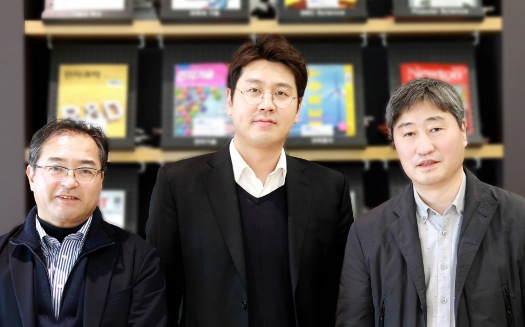 |
| March 24, 2020 | Volume 16 Issue 12 |
Designfax weekly eMagazine
Archives
Partners
Manufacturing Center
Product Spotlight
Modern Applications News
Metalworking Ideas For
Today's Job Shops
Tooling and Production
Strategies for large
metalworking plants
500 miles on a charge: Samsung announces solid-state battery for EVs
Researchers from the Samsung Advanced Institute of Technology (SAIT) and the Samsung R&D Institute Japan (SRJ) presented a study on high-performance, long-lasting all-solid-state batteries for electric vehicles (EVs) to Nature Energy, one of the world's leading scientific journals, on Mar. 9 in London.

Samsung researchers (from left) Yuichi Aihara, principal engineer from SRJ, Yong-Gun Lee, principal researcher, and Dongmin Im, master from SAIT. [Photo: Samsung]
Compared to widely used lithium-ion batteries that use liquid electrolytes, all-solid-state batteries use solid electrolytes, which support greater energy density -- opening the door for larger capacities -- and are demonstrably safer.
However, the lithium metal anodes that are frequently used in all-solid-state batteries are prone to trigger the growth of dendrites, which are needle-like crystals that can develop on the anode of a battery during charging. Dendrites can produce undesirable side effects that reduce a battery's lifespan and safety.
To overcome those effects, Samsung's researchers proposed using, for the first time, a silver-carbon (Ag-C) composite layer as the anode. The team found that incorporating an Ag-C layer into a prototype pouch cell enabled the battery to support a larger capacity and a longer cycle life, and it also enhanced its overall safety. Measuring just 5 µm (micrometers) thick, the ultrathin Ag-C nanocomposite layer allowed the team to reduce anode thickness and increase energy density up to 900 Wh/L. It also enabled them to make their prototype approximately 50 percent smaller by volume than a conventional lithium-ion battery.
Their promising research is expected to help drive the expansion of electric cars and trucks. The prototype pouch cell that the team developed would enable an EV to travel up to 800 km (497 miles) on a single charge and features a cycle life of over 1,000 charges.
As Dongmin Im, master at SAIT's Next Generation Battery Lab and the leader of the project explained, "The product of this study could be a seed technology for safer, high-performance batteries of the future. Going forward, we will continue to develop and refine all-solid-state battery materials and manufacturing technologies to help take EV battery innovation to the next level."
Many automakers, including Toyota and General Motors, have been working on solid-state battery technology. One drawback has been price, with the technology in its initial development proving to be prohibitively expensive. Samsung did not address price in their announcement about the technology.
Source: Samsung
Published March 2020
Rate this article
View our terms of use and privacy policy
